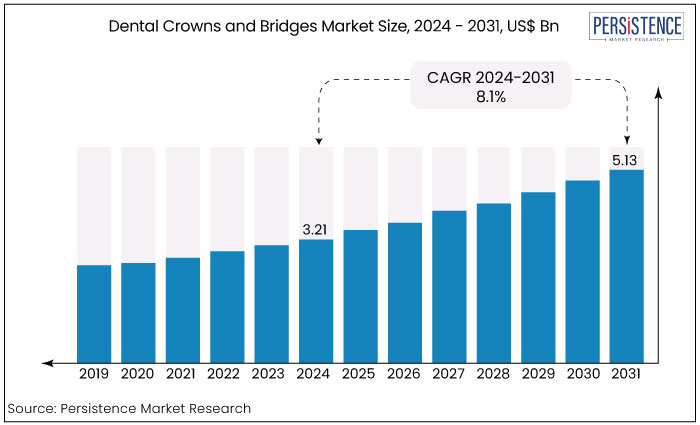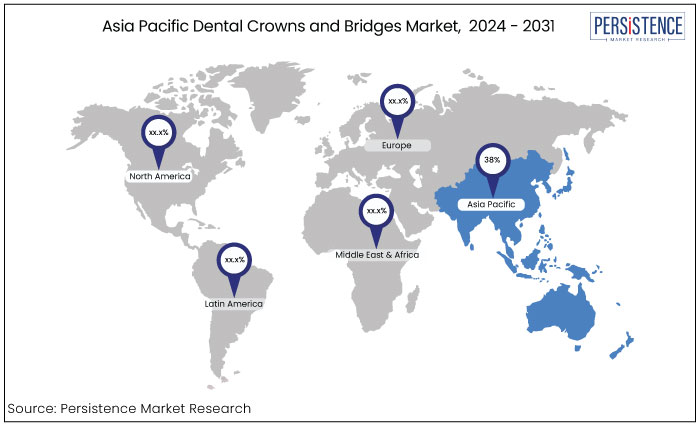Industry: Healthcare
Published Date: September-2024
Format: PPT*, PDF, EXCEL
Delivery Timelines: Contact Sales
Number of Pages: 175
Report ID: PMRREP3172
The dental crowns and bridges market is estimated to increase from US$3.21 Bn in 2024 to US$5.13 Bn by 2031. The market is projected to record a CAGR of 8.1% during the forecast period from 2024 to 2031. The adoption of CAD/CAM systems and 3D printing technology enhances the precision and speed which is one of the key driving factors for the dental crowns and bridges market. Asia Pacific is predicted to dominate the global market accumulating around 38% of the total market share.

Key Highlights of the Market
|
Market Attributes |
Key Insights |
|
Dental Crowns and Bridges Market Size (2024E) |
US$3.21 Bn |
|
Projected Market Value (2031F) |
US$5.13 Bn |
|
Global Market Growth Rate (CAGR 2024 to 2031) |
8.1% |
|
Historical Market Growth Rate (CAGR 2019 to 2023) |
6.9% |
|
Region |
Market Share in 2024 |
|
Asia Pacific |
38% |
Asia Pacific is estimated to hold significant market share throughout the forecast period. Insufficient levels of consumer knowledge are predicted to be a barrier to expanding the regional market. Despite this, the market participants have the opportunity to capitalize on ongoing initiatives to educate more people about dental care.
One of the most significant developments that has been observed in the sector is the expansion of medical tourism in the developing economy of Asia Pacific. Considering this, the healthcare industry in Asia Pacific is expanding at high rate. This is yet another chance for market participants to strengthen their position in the international market. The high frequency of oral problems is anticipated to encourage regional growth.

|
Category |
Market Share in 2024 |
|
Material - Titanium |
60% |
Based on material, the dental crowns and bridges market is classified into titanium and zirconium. Among these, the titanium material dominates the market. The titanium segment is expected to grow substantially during the forecast period due to the material's strong demand among dental surgeons. It possesses several appealing attributes, including unparalleled corrosion resistance, biocompatibility, and exceptional mechanical strength.
The elevated success rate and positive biological response associated with live tissues drive the need for titanium. The substance, with its versatile properties, is utilized diversely in contemporary dentistry and is gaining acceptance in other uncharted domains. This versatility is a testament to its potential and is sure to intrigue industry professionals about its future applications.
The application of titanium in prosthetic frameworks is not without its challenges. It requires additional technological advancements to address its limitations. This need for innovation and advancement is expected to propel the industry during the next seven years, emphasizing the urgency for technological solutions.
|
Category |
Market Share in 2024 |
|
Price - Premium |
42% |
Based on price, the market is classified into premium, value and discounted implants. Among these, the premium segment dominates the market. The premium implants segment is projected to experience significant growth over the forecast period driven by the robust presence of leading premium implant brands. These brands include Straumann, Nobel Biocare, Zimmer Biomet, and Dentsply Sirona.
The services of premium brands were costly in the past period. However, due to the swift rise of value and cheap implants, these brands are providing economical treatments to maintain market rivalry. Furthermore, premium companies are diligently pursuing mergers and acquisitions to enhance their market presence.
Dental crowns and bridges are prevalent restorative options for compromised or absent teeth. Crowns, or caps, encapsulate individual teeth to restore their shape, size, and strength while enhancing their appearance. They are frequently utilized for badly decaying or cracked teeth.
Bridges, conversely, substitute absent teeth by spanning the interval between the intact teeth. Dental crowns and bridges are generally constructed from porcelain, ceramic, or metal alloys, customized to resemble real teeth. These interventions rehabilitate dental function, improve dental aesthetics, and foster oral health by preventing more damage or displacement of neighbouring teeth.
The global market is growing due to the rising prevalence of dental caries and periodontal diseases. Tooth decay can be addressed with the application of crowns or bridges, which assist in preserving oral health.
The increasing awareness of oral health and the heightened demand for cosmetic dental procedures are anticipated to enhance the use of these prosthetic devices in the market. Also, developments in dental technologies resulting in enhanced materials and processes for crown and bridge construction substantially drive market expansion. The increase in dental tourism for restorative dental procedures further enhances market growth.
The dental crowns and bridges market has experienced consistent growth during the period from 2019 to 2023 due to the increasing prevalence of dental diseases, increasing aesthetic awareness, and technological advancements in dental restorations. The aging population and a growing focus on oral health played a key role in driving demand for dental crowns and bridges.
The market is expected to maintain robust growth, driven by advances in materials such as ceramic and zirconia, as well as the increasing adoption of digital dentistry solutions like CAD/CAM systems. Factors like expanding dental tourism, rising disposable income, and growing dental clinics in emerging markets will further support market expansion.
Aging Population and Increased Prevalence of Dental Diseases
One of the key drivers for the dental crowns and bridges market is the aging population. As people age, they are more prone to dental problems such as tooth decay, gum disease, and tooth loss. These issues lead to a high demand for restorative solutions like crowns and bridges.
The prevalence of dental diseases like periodontal disease, which affects the supporting structures of teeth, further increases the need for these treatments. According to the World Health Organization (WHO), oral diseases affect nearly 3.5 billion people globally making dental care a priority in healthcare systems.
As the aging population continues to grow especially in developed regions, the demand for crowns and bridges will likely to rise as patients seek to improve both functionality and aesthetics of their teeth.
Technological Advancements in Dental Materials and Procedures
Technological innovation in dental materials and procedures has been a significant growth driver for the dental crowns and bridges market. The development of durable and aesthetically pleasing materials like zirconia, ceramic, and porcelain has improved patient satisfaction and expanded the market.
Digital dentistry solutions such as CAD/CAM (computer-aided design/computer-aided manufacturing) have streamlined the production process of crowns and bridges, enabling more accurate, customized, and faster restorations. These advancements have also reduced chair time for patients, making the process more efficient and comfortable.
3D printing technology is beginning to make its mark on the dental field, providing faster prototyping and lower production costs. These innovations in materials and techniques not only improve patient outcomes but also drive the adoption of dental restorative procedures, bolstering market growth.
Growing Aesthetic Awareness and Demand for Cosmetic Dentistry
Increasing consumer awareness regarding dental aesthetics is a major driver for the dental crowns and bridges market growth. Patients are now more concerned about their appearance particularly their about smile, which has spurred the demand for cosmetic dentistry services.
Crowns and bridges significantly improve dental aesthetics, making them essential in the broader cosmetic dental procedures category. Social media influence, the rise of dental tourism, and higher disposable incomes are pushing more individuals to seek elective dental treatments that enhance the look of their teeth.
Young demographics seek restorative and cosmetic solutions not just for oral health but for aesthetic enhancement. This trend is especially prevalent in urban areas and emerging economies where rising incomes allow for discretionary spending on cosmetic procedures.
High Costs of Dental Crowns and Bridges Procedures
One of the key restraints for the dental crowns and bridges market is the high cost associated with these procedures. Dental restorations such as crowns and bridges often require advanced materials and skilled expertise making them expensive for many patients.
The out-of-pocket expenses can be prohibitive in regions where dental insurance is either limited or does not cover cosmetic or elective procedures. For instance, a single dental crown can cost anywhere from $800 to $2,500 depending on the material and complexity making it unaffordable for many of the population. This financial barrier reduces the overall accessibility of dental crowns and bridges especially in low- and middle-income countries, and could limit market growth in such regions.
Digital Dentistry and CAD/CAM Technology Adoption
One of the most transformative opportunities in the dental crowns and bridges market is the widespread adoption of digital dentistry solutions, particularly CAD/CAM (Computer-Aided Design and Computer-Aided Manufacturing) technology. These systems allow dentists to create highly precise, customized crowns and bridges more efficiently than traditional methods.
The use of digital impressions and 3D printing technologies also shortens the treatment process, reducing the need for multiple visits and improving patient satisfaction. CAD/CAM technology not only enhances the accuracy and quality of dental restorations but also reduces the overall production costs and time making the process accessible. As more dental practices invest in digital solutions, this trend is expected to revolutionize the dental crowns and bridges market. Consequently, creates significant opportunities for manufacturers of digital dentistry equipment and materials.
The market is highly competitive with several key players operating. Leading companies include Dentsply Sirona, Straumann Group, Nobel Biocare, Zimmer Biomet, and 3M. These key companies focus on product innovation particularly in materials like zirconia and CAD/CAM technology, to differentiate themselves.
The market is also characterized by regional players who offer cost-effective solutions especially in emerging markets. Strategic collaborations, mergers, and acquisitions are common as companies aim to expand their market presence and technological capabilities.
The growing adoption of digital dentistry tools and increasing focus on aesthetic dental solutions has intensified competition with players striving to meet the evolving needs of both practitioners and patients.
Recent Industry Developments in the Dental Crowns and Bridges Market
|
Attributes |
Details |
|
Forecast Period |
2024 to 2031 |
|
Historical Data Available for |
2019 to 2023 |
|
Market Analysis |
US$ Billion for Value |
|
Key Regions Covered |
|
|
Key Market Segments Covered |
|
|
Key Companies Profiled in the Report |
|
|
Report Coverage |
|
|
Customization & Pricing |
Available upon request |
By Material
By Price
By Region
To know more about delivery timeline for this report Contact Sales

The market is estimated to be valued at US$5.13 Bn by 2031.
The market is projected to exhibit a CAGR of 8.1% over the forecast period.
Some of the prominent industry participants in the market are Dentsply, Nobel Biocare, and Straumann Group.
Increased prevalence of dental diseases drives the market forward.
Asia Pacific region dominates the market for dental crowns and bridges.